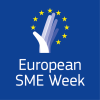Company: Voltfang
Country: Germany
We requalify electrical vehicle batteries after their first life in the EV into storage systems, which can store renewable energies in a sustainable way. The batteries do not need new resources & are more affordable.
For more information: https://voltfang.de/

Profile: Afshin Doostdar
Afshin is German of Iranian extraction. He has studied industrial engineering in France and mechanical engineering at RWTH Aachen University. His heroes are his parents and his mentors are everybody who has joining him on his journey and challenged him from early on, such as his first business angels. Afshin’s entrepreneurial spirit comes from his ambition to make a positive impact as soon as possible and to enjoy his time at work every day. His company Voltfang GmbH works in the energy storage sector.
INTERVIEW
Tell us about your business
Voltfang was founded in June 2021 by Roman Alberti, David Oudsandji and me. We offer an environmentally friendly alternative to conventional electricity storage with our sustainable electricity storage from used car batteries for industry and commerce. The production of new batteries is avoided and the life span of already used batteries is extended by double. This not only saves CO2 emissions, but also water, energy and amazing amounts of resources such as lithium and cobalt that would otherwise be used in battery production. This innovative concept enables a functioning circular economy for lithium-ion batteries, which already involve ethical-social problems in the mining areas of the resources in the run-up to production. In application, our energy storage systems enable the capping of expensive load peaks, support for the charging infrastructure of electric car fleets, securing of emergency power supply as well as the possibility of self-consumption optimization.
Where did you get the idea from?
In 2019, we came up with the idea when we wanted to drive with our camper to the festival While camping, we realized that the camper battery was not enough to power all the electrical appliances. Without further ado, we installed a solar system and tried out with different batteries.
How old were you when you first decided you would start your own business?
I was 20 years old and in the middle of my studies when I realized that I wanted to found something on my own. Working as an employee in a big coroporate didn't motivate me but whenever I was working on something for my own projects I could work tirelessly on it.
How did you get it off the ground?
We started as a team of three and quickly realized that we needed the first pilot projects to demonstrate the technical feasibility on the one hand and the need of the market on the other. Our first pilot projects were fully financed by the first customers, so that we could expand our team with the help of further grants and our own capital.
Who did you turn to for help?
We started talking to various mentors from acceleration programs and competitions early on to get feedback on our ideas. One of these mentors even joined us as the first business angel at a later stage, as he saw our progress continuously.
Describe some of the obstacles you faced as a young person starting out in this business.
One of the biggest challenges as a startup was gaining trust. On the customer side, we had to convince them to buy a 5-digit amount of battery storage from a young startup. on the supplier side, we had to convince large automotive manufacturers to entrust batteries to a young startup to give them a safe second life. Over time, however, we were able to show both sides our rapid organizational and technological progress and thus gain their trust.
How do you define success?
Success for me in the business can be defined in two ways: either we reach our goals with our team or we do not reach them but have learned for what reason.
What was the most challenging aspect of setting up your business?
The biggest challenge in the beginning, especially as a capital-intensive hardware startup, was to break the circle of dependencies of product development, paying customers and investors at the same time. You need each of the three to make it to the next stage but each one is highly depending on of the others. We had to break the circle by taking a higher risk.
What has been the most rewarding part of your journey so far?
The most rewarding part so far has been to build a team of more than 40 employees who work every day with full motivation to make a difference. Everyone brings in their own values, culture and ideas to the company and helps us to fulfill our great mission.
What are the future goals of your business, and how will you go about achieving it?
Our mission is to enable a future worth living together with our team, product, and our customers. For this, we need to scale the further use of 2nd life batteries and therefore want to build the largest 2nd life factory in europe by 2025 There we will generate over tens of thousands of units annually and thus create a blueprint for circular economy. Our long term goal is to build a large virtual power plant with our sustainable battery storages in the field and thus enable the energy transition to renewables.
What advice would you give to other aspiring entrepreneurs out there?
I suggest everyone who has the dream to be an entrepreneur or to solve a specific problem to just give it a try. You need the right team and need to show endurance at every challenge, then everything will take the right path.
- Logáil isteach chun tráchtanna a phostáil

